|
 Secure Site
Secure Site
|
 |
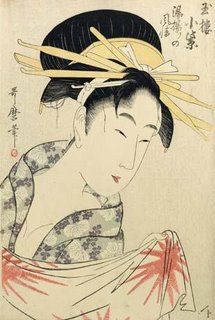 Choose a Soothing Alarm Clock - Kitagawa Utamaro, Komuraski of the Tamaya, House After a Bath, 1795 Getting enough sleep? Probably not.
A new study in the Journal of Clinical Sleep Medicine finds that people tend to overestimate — not underestimate — the amount of sleep that they get.
The finding could add weight to the idea that Americans already skimp too much on sleep. And since many of us may be sleeping even less than we think, our lack of shut-eye may go largely unnoticed.
“People are losing sleep,” says lead author Graciela Silva, assistant professor, college of nursing and health care innovation, at Arizona State University. “Although seven and a half to eight hours are recommended, people sleep, on average, six hours each night,” she said.
But the surprise lay in the fact that most of the time, people were unaware that they were getting so little sleep.
“What is innovative and unexpected is that the older adults overestimated their sleep, rather than underestimated it,” said Dr. Phyllis Zee, director of the sleep disorders center at Northwestern University in Chicago, Ill.
“As for the issue of sleep in our society, it looks like we are sleeping even less than we thought — which is often insufficient for mental and physical health to begin with,” said James Olcese, associate professor of the department of biomedical sciences at Florida State University College of Medicine in Tallahassee, Fla.
The findings of the study are further driven home by its sheer magnitude. A total of 2,113 participants, aged 40 years or older, participated in the study. Rather than taking a sample from a patient population known to have sleep problems or illnesses, this study examined a population largely representative of the general population.
 American don't get enough sleep -- a soothing alarm clock with gentle chimes can make all the difference And participants did not even have to leave their own bed. Unlike previous studies that required participants to be present in the sleep lab to undergo tests, in this study, researchers, instead, followed subjects into their own homes.
There, the technicians hooked participants up to a polysonogram, a sleep test that measures brain waves to determine the amount of sleep they are actually getting.
The Morning After
The next morning, participants were asked to report how much sleep they felt they routinely enjoyed, as well as how many hours of sleep they believed they had the previous night.
What researchers found was that participants consistently overestimated the amount of sleep they actually got. They estimated that they typically slept seven hours, but the polysonogram recorded a modest six.
Olcese said the results suggest that researchers may be better off conducting objective tests like polysonograms, rather than patient questionnaires, when it comes to figuring out exactly how much sleep a person is getting.
“Simply put, this study reminds us that what people say that they are doing is not always exactly correct,” he said. “Personal subjectivity usually biases the results of questionnaires somewhat, so don’t believe everything you hear, unless there is objective confirmation.
“These findings draw attention to the need for objective measures of sleep parameters, rather than using subjective evaluations.”
However, the findings were not shocking to everyone.
“This really does not surprise me,” said Dr. Nancy Collop, medical director of the Johns Hopkins Hospital Sleep Disorders Center, in Baltimore. In her sleep studies, she has found that patients routinely misperceive how much they sleep, often stating “I didn’t sleep at all.”
Not getting enough sleep may be so pervasive within our society that many may not view it as a big problem.
However, missing out on sleep is more detrimental than many may realize.
“As we have progressed, people are losing sleep time,” explained Silva, who is concerned that a sleep deficiency may affect daily functioning. This, she said, underscores the implications of her research for the thousands of physicians who routinely ask patients about their sleep habits.
“Physicians should take into account that people overestimate their sleep time,” Silva said.
Zee agrees, and added that doctors often rely on subjective reports. “So, doctors need to be cognizant that older adults may be overestimating, and if they are actually getting less sleep, [it] may be associated with increased risk for cardiovascular, metabolic conditions that have been associated with short sleep duration.”
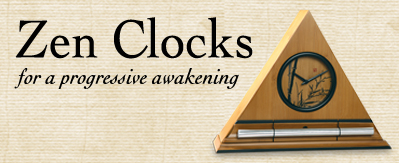 The Alternative Soothing Alarm Clock - Choose from Chime Clocks or Gong Alarm Clocks - Boulder, CO More ZZZZs, Anyone?
Fortunately, there are steps that those wishing to maximize their sleep, or improve its quality, may take. These include refraining from heavy meals, hot baths, or vigorous exercise close to bedtime.
Caffeine lovers should avoid caffeinated beverages late in the day, and technology connoisseurs should relocate all of their noise-making gadgets — including computers and televisions — out of the bedroom.
If all else fails, and you are not rested after sleeping, Collop suggests actively trying to get more sleep.
Wake up refreshed, love your alarm clock, transform your mornings with The Zen Alarm Clock’s progressive awakening with gentle chimes. Our Zen Timepiece’s acoustic 6-inch brass bowl-gong clock is the world’s ultimate soothing alarm clock.
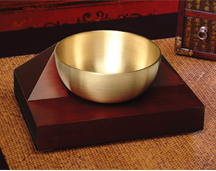 Singing Bowl Alarm Clock - The Soothing Alarm Clock for a Peaceful Morning It fills your environment with beautifully complex tones whenever it strikes. In the morning, its exquisite sounds summon your consciousness into awakening with a series of subtle gongs that provide an elegant beginning to your day. Once you experience the Zen Timepiece’s progressive awakening, you’ll never want to wake up any other way. It also serves as the perfect meditation timer. Available in 5 wood styles, including bamboo (shown).
adapted from abcnews.go.com by By STEPHANIE TODD, M.D.
Now & Zen – The Zen Alarm Clock Shop
1638 Pearl Street
Boulder, CO 80302
(800) 779-6383
orders@now-zen.com
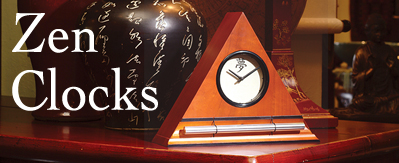 The best soothing alarm clock -- alternative clocks with gongs and chimes
Posted in Insomnia, Natural Awakening, sleep, Sleep Habits, wake up alarm clock
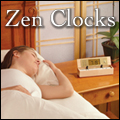 Choose a relaxing alarm clock - The Zen Alarm Clocks with Progressive Chimes  Sleep sounder - choose a relaxing alarm clock with gentle chimes “There is a direct relationship between the hours worked and its negative impact on sleep,” says James C. Walsh, vice president of the National Sleep Foundation. “This is particularly noticeable for people working more than 40 hours per week.” The study found most people tried to compensate for the lack of sleep during the week by tacking on a couple extra hours on the weekend.
Sleepy at Work and the Wheel
Ironically, while most sleep-deprived Americans say they give up sleep for work, nearly 40 percent say they are so sleepy several days a month that it interferes with their daily activities.
While sacrificing sleep can be counter-productive in the workplace, Gelula says it can be dangerous in a nation dependent on travel by car. Nearly one half of adults report they have driven while drowsy in the past year and nearly 20 percent say they have actually fallen asleep while driving.
“We have our work cut out for us to educate Americans that sleep is a necessity, not a luxury,” says Gelula.
Wake up with gradual, beautiful acoustic chimes. The Zen Alarm Clock transforms your mornings and gets you started right, with a progressive awakening.
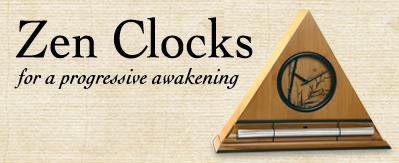 The only relaxing alarm clock - The Acoustic Zen Alarm Clock by Now & Zen, Inc.
Waking Up in the Morning as a Form of Spiritual Practice
Waking up in the morning is a metaphor for life — a kind of daily microcosmic reenactment of our overall purpose for being in the world. That is, just about every religious tradition emphasizes spiritual growth. And the connection between “awakening” and spiritual growth can be found in practically all forms of spiritual teaching.
So if waking up in the morning really is a metaphor for our larger spiritual lives, this perspective might help us treat our morning ritual of getting out of bed as a kind of spiritual practice. Indeed, when approached in this way, how we wake up in the morning can make a larger difference in our lives overall.
Fortunately, for those who want to wake up right, without being startled awake by an annoying alarm or some radio DJ, there is The Zen Alarm Clock. This clock was designed to make waking up a kind of spiritual practice. The Zen Clock wakes users with a built-in 10 minute gradual progression of acoustic chimes. And this gradual form of “progressive awakening” has been thoughtfully designed to include esoteric features that are fitting for a form of spiritual practice. For example, not only is the hardwood Zen Alarm Clock beautiful to see and hear, the clock’s chime is tuned to produce the same frequencies as the tuning forks used by musical therapists in their healing work. Moreover, the Zen Clock’s pre-programmed 10 minute chime progression sequence advances according to the “golden ratio,” which reflects both the natural proportions of our own bodies and the patterns of growth used in the overall evolution of the universe. Even those who care little about such esoteric details nevertheless report that they love waking up with the gentle chimes of a Zen Alarm Clock. And as the makers of the Zen Alarm Clock hope, we may eventually come to see many of the simple details of our lives as forms of authentic spiritual practice.
 The Alternative Alarm Clock Shop - Boulder, CO
Now & Zen – The Only Relaxing Alarm Clock Store
1638 Pearl Street
Boulder, CO 80302
(800) 779-6383
orders@now-zen.com
Posted in Bamboo Chime Clocks, Now & Zen Alarm Clocks, sleep, Sleep Habits, wake up alarm clock
 Choose a Relaxing Alarm Clock - An Alternative Alarm Clock with Gentle Chimes  Relaxing Alarm Clocks - The Zen Alarm Clocks Shop, Boulder, CO A Wake-Up Call for Your Health
A solid third of your life should be spent in slumber, and not just so you can recover from those happy hours gone wild. Sleep is critical for overall health, says Maas, “and people are starting to realize it’s a necessity, not a luxury.” As you snooze, your body repairs errant cells, builds bone and muscle, consolidates memories, and stores up energy for the days, weeks, and years ahead. Sleep is so important, in fact, that some doctors consider how much you get to be a vital sign, on par with body temperature and blood pressure, says Lankford.
When you’re spent, your healthy habits tend to disappear. Fatigue makes the body crave a quick hit of energy–otherwise known as a high-calorie carb-fest. (Ever hit a fast-food drive-through after a rough night?) Going to the gym, a smarter pick-me- up, can seem about as doable as taking a trip to Mars, which is why nearly 50 percent of women report skipping exercise when they’re beat, according to the NSF.
Habitually skimping on shut-eye can also lead to chronic health problems or worsen preexisting ailments. “Sleep deprivation is cumulative,” says Lankford.
“If someone needs eight hours a night and gets only six every night for a week, by Friday she will be functioning on sleep debt.” Long term, that can spell malfunctioning hormones that pave the way for increased risks of depression, heart problems, gastrointestinal issues, type 2 diabetes, and breast and colorectal cancers. (Breast cancer, for example, has been linked to high levels of estrogen and low levels of melatonin; production of both of these hormones is affected when you’re sleep deprived.)
Wake up refreshed, love your alarm clock, transform your mornings with The Zen Alarm Clock’s progressive awakening with gentle chimes. Choose the only relaxing alarm clock.
Boulder, Colorado—an innovative company has taken one of life’s most unpleasant experiences (being startled awake by your alarm clock early Monday morning), and transformed it into something to actually look forward to. “The Zen Alarm Clock,” uses soothing acoustic chimes that awaken users gently and gradually, making waking up a real pleasure.
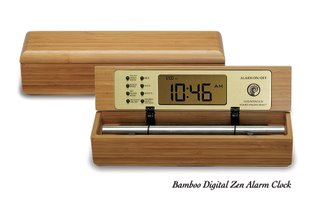 Relaxing Alarm Clocks - Chime Alarm Clocks - Soothing - Elegant Sounds Rather than an artificial recorded sound played through a speaker, the Zen Clock features an alloy chime bar similar to a wind chime. When the clock’s alarm is triggered, its chime produces a long-resonating, beautiful acoustic tone reminiscent of a temple gong. Then, as the ring tone gradually fades away, the clock remains silent until it automatically strikes again three minutes later. The frequency of the chime strikes gradually increase over ten-minutes, eventually striking every five seconds, so they are guaranteed to wake up even the heaviest sleeper. This gentle, ten-minute “progressive awakening” leaves users feeling less groggy, and even helps with dream recall.
 Alarm Clocks that are Relaxing - Visit our Boulder, CO Store
Now & Zen – The Relaxing Alarm Clock Store
Alternative Alarm Clocks and Timers
1638 Pearl Street
Boulder, CO 80302
Posted in Bamboo Chime Clocks
 Choose an Alternative Alarm Clock - Ukiyo-e Toshi Yoshida Sanbu Zaki Cherry Blossoms Imagine a long leisurely lunch with a nap instead of a cold sandwich in front of your computer.
“It makes absolute sense,” said Dr. James Parish, medical director for the Sleep Disorder Center of the Mayo Clinic in Scottsdale, Ariz. “Sleep research has recently and repeatedly shown us what we have known for a long time and that is that sleep deprivation is an epidemic in this country.”
A new global Internet survey by the U.K.-based Sleep Council, a non-profit organization that advocates more sleep, calls for implementation of the siesta. The survey, released Sunday, asked people when they felt most alert and productive. Of 12,000 respondents, mostly from the United States and Europe, 41 percent said in the morning, while 38 percent said they hit felt most alert in the evening.
“The implication is that the majority are not fully alert in the middle of the day — the traditional time for a siesta in hot countries,” sleep expert Chris Idzikowski, a professor at Surrey University who conducted the two-year sleep study, told Reuters.
A Sleep Deprived Nation
Sleep deprivation usually manifests itself in feeling especially drained in the afternoon, say sleep experts. It’s the time of day when serotonin and dopamine levels, which regulate mood, sleep and emotion, naturally dip. And if you are already sleepy, this dip is even more dramatic.
“This feeling of drowsiness is sometimes associated with the mid-day meal,” said Dr. Michael Smolensky, author of The Body Clock Guide to Better Health and professor of environmental physiology at the University of Texas School of Public Health in Houston. “But it really has a lot more to do with natural changes in the brain at this time in the afternoon. The body clock naturally governs itself and it includes this natural dip in the afternoon.”
Many European countries and others with hot climates have long implemented an afternoon down time, or siesta, when stores close, business shut down and residents go home for a nap, or take a long rest at a cafe or restaurant.
Experts say that with a rest during the afternoon hours when the serotoninergic system in a person’s brain slows, workers might perform better at their jobs, and even be more safe.
“What we see in children and adults with this loss of alertness is also a loss of hand/eye coordination in the afternoon,” Smolensky said. “Frankly, I sometimes take a short power nap in the afternoon.” Another way to feel refreshed in the afternoon, if you are not one who naps, is to take a rest, walk around the block, sit on a park bench, Smolensky says.
Less Sleep, More Bragging
“[Americans] like to brag about how little sleep they need, almost as if they are bragging about how many cars we own,” said Dr. Phyllis Zee, director of Chicago’s Northwestern Memorial Hospital’s Sleep Disorder Center. “We say we can get away with something like six hours of sleep. But, that’s not enough sleep. Most people need eight hours of sleep. This is why we feel tired in the afternoon and run down.”
 Alternative Alarm Clock Store - Boulder, CO The Council’s study suggests that workers allowed to follow their natural sleeping habits and rhythms would benefit employers by expanding working hours and production.
“It’s a very cultural thing for Americans to push themselves during the day,” said Zee. “With an economy that moves and changes quickly and rapidly, the harder you work and the longer hours you put in, you think you are more productive. But it reaches a point when you are sleep deprived, then you are just going to make mistakes and that productivity you perceive won’t matter.”
Waking up in the morning should be as pleasant as falling asleep at night. The Zen Alarm Clock’s gradual, gentle awakening is transformative.
One of the most alternative alarm clocks is called The Zen Alarm Clock. The Zen Clock’s long-resonating Tibetan bell-like chime makes waking up a beautiful experience – its progressive chimes begin your day with grace. When the clock’s alarm is triggered, the acoustic chime bar is struck just once … 3-1/2 minutes later it strikes again … chime strikes become more frequent over 10 minutes … eventually striking every 5 seconds until shut off. As they become more frequent, the gentle chimes will always wake you up – your body really doesn’t need to be awakened harshly, with a Zen Clock you’re awakened more gradually and thus more naturally. Unlike artificial recorded sounds coming out of a tiny speaker in a plastic box, natural acoustic sounds transform your bedroom or office environment.
adapted from abcnews.go by By Rose Palazzolo
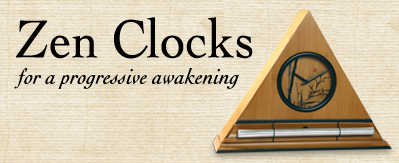 Choose an Alternative Alarm Clocks -- The Zen Alarm Clock Store - Boulder, CO 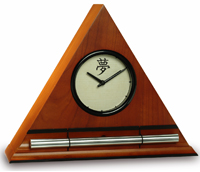 The Alternative Alarm Clock Store - Alarm Clocks with Gongs and Chimes Now & Zen – The Alternative Alarm Clock Store
1638 Pearl Street
Boulder, CO 80302
(800 779-6383
Posted in Bamboo Chime Clocks, Natural Awakening, Now & Zen Alarm Clocks, sleep, Sleep Habits
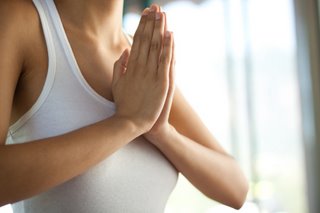 Wake-Up It’s often hard to find the inspiration to get out of your nice, comfortable bed when you’re still so tired. But according to Kundalini yoga, a built-in supply of energy lies dormant at the root of the spine, like a bulb that rests underground, waiting for a cue to bloom. By accessing this vitality, you’ll have the charge you need to fire up your day — without having to resort to a double latte.
“When you awaken your Kundalini energy and get it flowing up your spine,” says Maya Fiennes, a London yoga teacher and star of the DVD “Kundalini Yoga to Detox and Destress,” “you become alert and uplifted instead of sluggish and stressed.” We worked with Fiennes to develop this series of simple moves that stretch and strengthen the spine, increase vitality, reduce tension, release impurities, and improve focus — everything you need to face what lies ahead.
Camel Ride Targets
The lower spine.
What It Does
Releases lower-back tension, opens the hips, stimulates the digestive and immune systems, and promotes mental focus. “When you flex the spine,” says Fiennes, “you flex the mind.”
How to Do It
Sit cross-legged on the floor with your hands resting on your ankles. Bring your ribs and chest forward, gently arching your back, as you inhale. Then move the rib cage backward and round your lower spine as you exhale. Keep your neck relaxed and your chin parallel to the ground. Continue doing this exercise in unison with your breath for about two minutes and repeat. Set your Zen Alarm Clock to repeat every 2 minutes so that you can concentrate on streching.
Adapted from Body + Soul Magazine, March 2008 by Kate Hanley
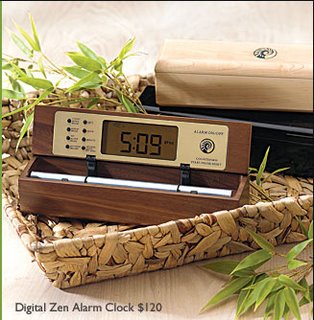 Natural Wake-Up Clock with Chime for Progressive Awakening Now & Zen’s Clock and Meditation Timer Store
1638 Pearl Street
Boulder, CO 80302
(800) 779-6383
Posted in Bamboo Chime Clocks, Chime Alarm Clocks, Natural Awakening, Now & Zen Alarm Clocks, sleep, Sleep Habits, Well-being
 zen monk Zen proverb: “Before enlightenment, chop wood, carry water. After enlightenment, chop wood, carry water.”
The idea is that we should find meaning in ordinary tasks, because true clarity is fleeting enough…
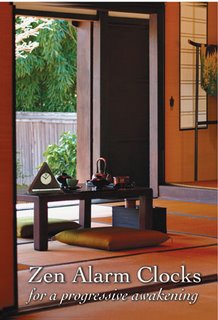 zen clocks and timers with soothing chimes
Posted in Bamboo Chime Clocks, Now & Zen Alarm Clocks
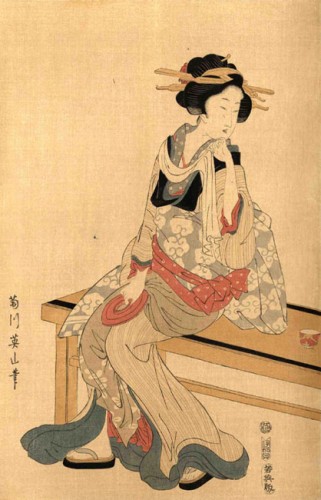 Getting the Sleep of Your Dreams - Choose a Soothing Alarm Clock We are a sleep-starved nation. Sixty-three percent of American adults do not get eight hours of sleep at night, about 70 million suffer from insomnia, and according to the National Sleep Foundation, nearly seven out of ten report frequent sleeping problems—although most remain undiagnosed. Alarmed? You should be. As Stanford University “sleepdebt” expert William C. Dement, MD, PhD, warns: “Lost sleep accumulates as a debt that must be repaid or health eventually deteriorates.”
This year, the Institute of Medicine released a report linking sleep disorders and sleep deprivation to a host of ills, including an increased risk of hypertension, diabetes, obesity, depression, heart attack, and stroke.
Scientists are confirming what yogis and ayurvedic physicians have reported for centuries: deep sleep rests the body and the mind. Our daily dose of shut-eye regulates our weight, strengthens our immunity, protects our cardiovascular health, repairs our tissues and cells, and restores our energy. Sleep also allows us to process, consolidate, and retain new memories; it balances our emotions, makes us better problem solvers, and feeds our creativity.
But according to yoga, deep, refreshing sleep has an even more important function: it helps us stay spiritually balanced. The ancientrishis (seers) classified sleep as one of the four fountains, or primitive urges (along with food, sex, and self-preservation), that operate at an instinctual level to maintain our survival. When one of these fountains is out of balance, it can imbalance the others, creating obstacles to spiritual growth. For example, when we skimp on sleep, we tend to overeat and imbalance the “food” fountain. Scientific research confirms this: A recent Stanford University study found that the less sleep people got, the heavier they were. Shorter sleep duration boosts our level of ghrelin, a hormone that makes us feel hungry, and suppresses another hormone called leptin, which makes us feel full. And at Case Western Reserve University, researchers who conducted a long-term study with 68,000 women over 16 years found that women who got fewer than five hours of sleep each night were much more likely to gain 33 pounds or more—despite the fact that they ate less than the seven-hour sleepers.
When we fail to get enough sleep, our anxiety level rises, too, disturbing the “self-preservation” fountain. Plus, it’s difficult to maintain a yoga practice when you’re overtired. Who wants to get up early to meditate after tossing and turning all night? Missing our practice can throw our whole day off balance and, worse, feed the cycle of insomnia.
 Wake up with gradual, beautiful acoustic chimes. The Zen Alarm Clock transforms your mornings and gets you started right, with a progressive awakening Instead, wake up refreshed, love your alarm clock, transform your mornings with The Zen Alarm Clock’s progressive awakening with gentle chimes.
Boulder, Colorado—an innovative company has taken one of life’s most unpleasant experiences (being startled awake by your alarm clock early Monday morning), and transformed it into something to actually look forward to. “The Zen Alarm Clock,” uses soothing acoustic chimes that awaken users gently and gradually, making waking up a real pleasure.
Rather than an artificial recorded sound played through a speaker, the Zen Clock features an alloy chime bar similar to a wind chime. When the clock’s alarm is triggered, its chime produces a long-resonating, beautiful acoustic tone reminiscent of a temple gong. Then, as the ring tone gradually fades away, the clock remains silent until it automatically strikes again three minutes later. The frequency of the chime strikes gradually increase over ten-minutes, eventually striking every five seconds, so they are guaranteed to wake up even the heaviest sleeper.
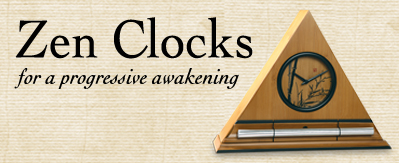 Soothing Chime Alarm Clocks with Natural Acoustic Sounds Now & Zen – The Soothing Chime Alarm Clock Store
1638 Pearl Street
Boulder, CO 80302
(800) 779-6383
Posted in Bamboo Chime Clocks, Now & Zen Alarm Clocks, Progressive Awakening, sleep, Sleep Habits
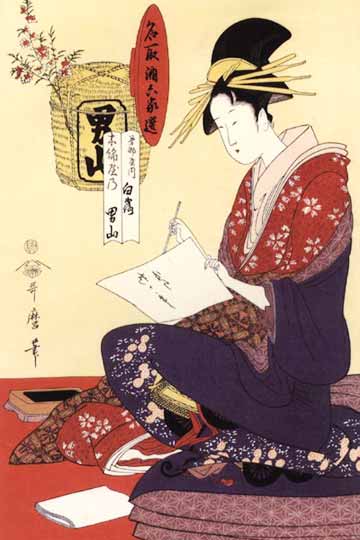 Gong Meditation Timers - The Zen Alarm Clock can effect your awareness in a variety of positive ways, all of which require your participation (HealthDay News) — Meditation can take many forms, including the art of deep breathing. It’s a great way to relieve stress.
The American Academy of Family Physicians offers these steps to deep breathing, which helps your body get plenty of oxygen:
Lie on your back on a flat surface.
- Rest one hand on your stomach above your belly button, and the other hand on your chest.
- Breathe in slowly and deeply, making your stomach rise a bit. Hold for a second.
- Slowly exhale, so that your stomach goes back down.
- Set Your Zen Timepiece with Gong to repeat every 2 minutes.
- Repeat several times.
adapted from abcnews.com by By Diana Kohnle
Meditation is generally an inwardly oriented, personal practice, which individuals do by themselves. Meditation may involve invoking or cultivating a feeling or internal state, such as compassion, or attending to a specific focal point. The term can refer to the state itself, as well as to practices or techniques employed to cultivate the state. There are dozens of specific styles of meditation practice; the word meditation may carry different meanings in different contexts. Meditation has been practiced since antiquity as a component of numerous religious traditions. A 2007 study by the U.S. government found that nearly 9.4% of U.S. adults (over 20 million) had practiced meditation within the past 12 months, up from 7.6% (more than 15 million people) in 2002.
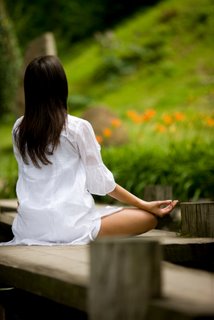 Meditation - The Zen Alarm Clock is a consciousness-raising tool.
Although meditation can be done in almost any context, practitioners usually employ a quiet, tranquil space, a meditation cushion or bench, and some kind of timing device to time the meditation session. Ideally, the more these accoutrements can be integrated the better. Thus, it is conducive to a satisfying meditation practice to have a timer or clock that is tranquil and beautiful. Using a kitchen timer or beeper watch is less than ideal.
And it was with these considerations in mind that we designed our Zen Alarm Clock and practice timer. This unique “Zen Clock” features a long-resonating acoustic chime that brings the meditation session to a gradual close, preserving the environment of stillness while also acting as an effective time signal.
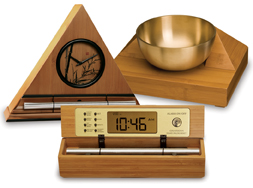 Use our unique "Zen Clock" which functions as a Yoga Timer. It features a long-resonating acoustic chime that brings your meditation or yoga session to a gradual close, preserving the environment of stillness while also acting as an effective time signal.
Now & Zen
The Gong Meditation Clock Shop
Downtown Boulder, Colorado
1638 Pearl Street
Boulder, CO 80302
(800) 779-6383
Posted in Meditation Timers, mindfulness practice, Zen Timepiece by Now & Zen, Zen Timers
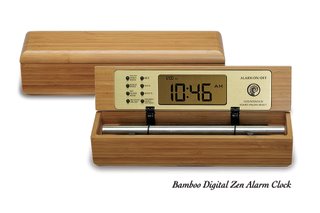 stillness practice tools and timers …that he washes dishes with as much care as he would if he were bathing the newborn Buddha: “If I am incapable of washing dishes joyfully, if I want to finish them quickly so I can go and have a cup of tea, then I will be incapable of drinking the tea joyfully.”
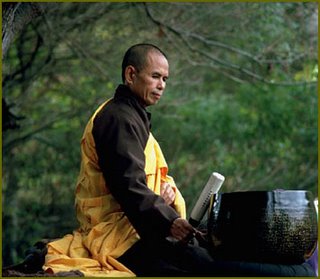 Thich Nhat Hanh Now & Zen – The Gong Meditation Timer Shop
1638 Pearl Street
Boulder, CO 80302
Posted in Bamboo Chime Clocks, zen monks, Zen Timepiece by Now & Zen, Zen Timers
 Re-wire Your Brain for Happiness - Choose a Meditation Timer with Chime A quiet explosion of new research indicating that meditation can physically change the brain in astonishing ways has started to push into mainstream.
Several studies suggest that these changes through meditation can make you happier, less stressed — even nicer to other people. It can help you control your eating habits and even reduce chronic pain, all the while without taking prescription medication.
Meditation is an intimate and intense exercise that can be done solo or in a group, and one study showed that 20 million Americans say they practice meditation. It has been used to help treat addictions, to clear psoriasis and even to treat men with impotence.
The U.S. Marines are testing meditation to see if it makes more focused, effective warriors. Corporate executives at Google, General Mills, Target and Aetna Insurance, as well as students in some of the nation’s classrooms have used meditation.
Various celebrities also are known meditators, including shock jock Howard Stern, actors Richard Gere, Goldie Hawn and Heather Graham, and Rivers Cuomo, the lead singer of the band Weezer.
In one study, a research team from Massachusetts General Hospital looked at the brain scans of 16 people before and after they participated in an eight-week course in mindfulness meditation. The study, published in the January issue of Psychiatry Research: Neuroimaging, concluded that after completing the course, parts of the participants’ brains associated with compassion and self-awareness grew, and parts associated with stress shrank.
Recently, the Dalai Lama granted permission for his monks, who are master mediators, to have their brains studied at the University of Wisconsin, one of the most high-tech brain labs in the world.
Richie Davidson, a PhD at the university, and his colleagues, led the study and said they were amazed by what they found in the monks’ brain activity read-outs. During meditation, electroencephalogram patterns increased and remains higher than the initial baseline taken from a non-meditative state.
But you don’t have to be a monk to benefit from meditation, which is now gaining acceptance in the field of medicine.
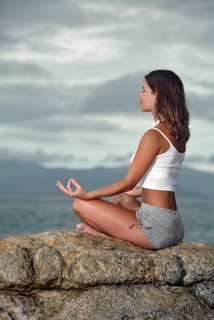 The Most Soothing Meditation Timer and Clock with Chime Physicians have increasingly started prescribing meditation instead of pills to benefit their patients. A Harvard Medical School report released in May found that more than 6 million Americans had been recommended meditation and other mind-body therapies by conventional health care providers.
Perhaps the most mind-bending potential benefit of meditation is that it will actually make practitioners nicer. Chuck Raison, a professor at Emory University, conducted a meditation study in which he hooked up microphones to participants who had been taught basic meditation and those who hadn’t. He then recorded them at random over a period of time. Raison found that these newly-trained mediators used less harsh language than people who had no meditation experience.
“They were more empathic with people,” Raison said. “They were spending more time with other people. They laugh more, you know, all those things. They didn’t use the word ‘I’ as much. They use the word ‘we’ more.”
However, even the Dalai Lama admitted that meditation is not the silver bullet cure-all for every ailment or emotion.
“Occasionally, [I] lose my temper,” he said. “If someone is never lose temper then perhaps that may come from outer space, real strange.”
The Dalai Lama also cautioned that meditation takes patience, so new mediators should not expect immediate results.
“The enlightenment not depend on rank,” he said, laughing. “It depends on practice.”
Some scientists believe that in a generation, Americans will see meditation as being as essential to maintaining a healthy lifestyle as diet and exercise.
Although meditation can be done in almost any context, practitioners usually employ a quiet, tranquil space, a meditation cushion or bench, and some kind of timing device to time the meditation session. Ideally, the more these accoutrements can be integrated the better. Thus, it is conducive to a satisfying meditation practice to have a timer or clock that is tranquil and beautiful. Using a kitchen timer or beeper watch is less than ideal.
And it was with these considerations in mind that we designed our digital Zen Alarm Clock and practice timer. This unique “Zen Clock” features a long-resonating acoustic chime that brings the meditation session to a gradual close, preserving the environment of stillness while also acting as an effective time signal.
adapted from worldnewsreport.com by Maggy Patrick and Lauren Effron
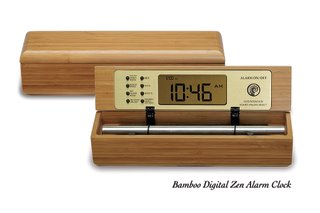 The Most Soothing Meditation Timer and Clock with Acoustic Chime Now & Zen – The Meditation Timer Store
1638 Pearl Street
Boulder, CO 80302
(800) 779-6383
Posted in Meditation Timers, Meditation Tools, Now & Zen Alarm Clocks, Zen Alarm Clock, Zen Timepiece by Now & Zen, Zen Timers
|
|
|
|